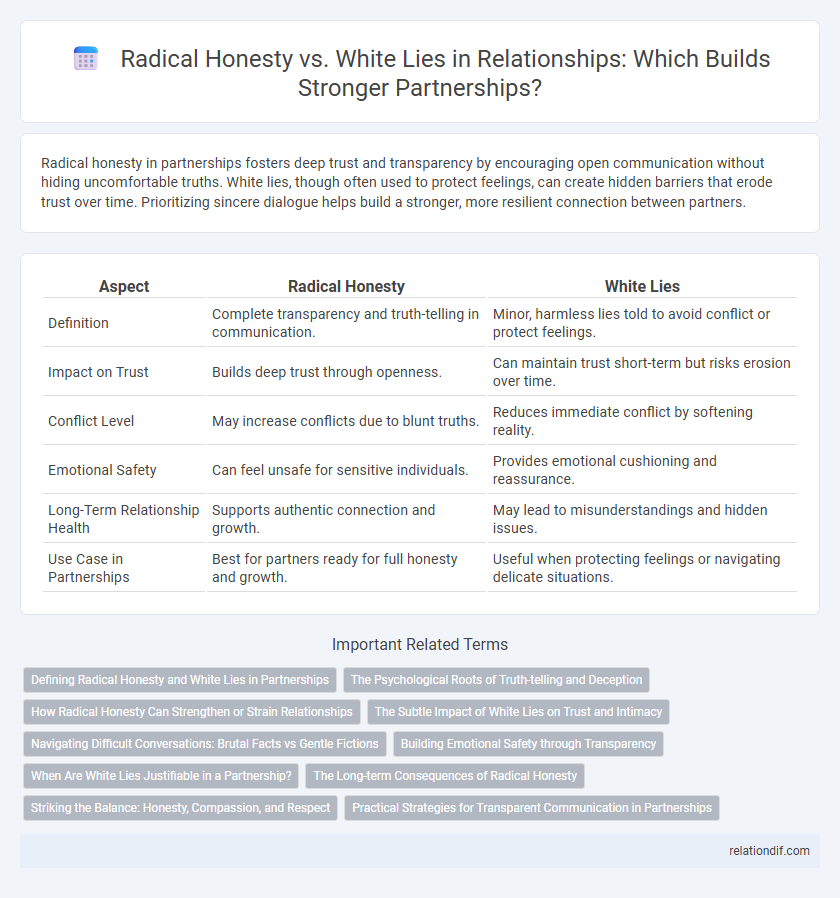Radical honesty in partnerships fosters deep trust and transparency by encouraging open communication without hiding uncomfortable truths. White lies, though often used to protect feelings, can create hidden barriers that erode trust over time. Prioritizing sincere dialogue helps build a stronger, more resilient connection between partners.
Table of Comparison
| Aspect | Radical Honesty | White Lies |
|---|---|---|
| Definition | Complete transparency and truth-telling in communication. | Minor, harmless lies told to avoid conflict or protect feelings. |
| Impact on Trust | Builds deep trust through openness. | Can maintain trust short-term but risks erosion over time. |
| Conflict Level | May increase conflicts due to blunt truths. | Reduces immediate conflict by softening reality. |
| Emotional Safety | Can feel unsafe for sensitive individuals. | Provides emotional cushioning and reassurance. |
| Long-Term Relationship Health | Supports authentic connection and growth. | May lead to misunderstandings and hidden issues. |
| Use Case in Partnerships | Best for partners ready for full honesty and growth. | Useful when protecting feelings or navigating delicate situations. |
Defining Radical Honesty and White Lies in Partnerships
Radical honesty in partnerships involves complete transparency and sharing all thoughts and feelings without filtering, fostering deep trust and emotional intimacy. White lies are minor, often harmless falsehoods meant to protect a partner's feelings or avoid conflict, preserving harmony and reducing tension. Understanding the balance between radical honesty and white lies is essential for maintaining healthy communication and mutual respect within a relationship.
The Psychological Roots of Truth-telling and Deception
The psychological roots of truth-telling and deception in partnerships stem from deep-seated fears of rejection and desire for acceptance. Radical honesty promotes trust and emotional intimacy by encouraging open expression of one's authentic feelings, while white lies often serve as social lubricants to avoid conflict or maintain harmony. Understanding these motivations helps partners navigate the delicate balance between vulnerability and self-protection in their communication.
How Radical Honesty Can Strengthen or Strain Relationships
Radical honesty fosters deep trust and emotional intimacy by encouraging transparent communication and authentic expression of feelings, which can resolve misunderstandings before they escalate. However, this unfiltered truthfulness may also strain relationships if delivered without empathy, potentially causing hurt or defensiveness between partners. Balancing radical honesty with sensitivity promotes a healthier partnership dynamic, enhancing mutual respect while preventing unnecessary conflict.
The Subtle Impact of White Lies on Trust and Intimacy
White lies in partnerships, though often seen as harmless, subtly erode trust by creating uncertainty about true intentions and feelings. Over time, these seemingly minor deceptions accumulate, weakening emotional intimacy and fostering doubt. Genuine communication grounded in radical honesty strengthens relational bonds and promotes deeper understanding between partners.
Navigating Difficult Conversations: Brutal Facts vs Gentle Fictions
Radical honesty in partnerships demands confronting brutal facts directly, fostering deep trust and authentic connection by eliminating misunderstandings. White lies serve as gentle fictions that can soften the impact of difficult conversations, preserving harmony but potentially undermining long-term transparency. Navigating this balance requires discerning when honesty enhances mutual growth versus when tactful omissions maintain emotional safety.
Building Emotional Safety through Transparency
Radical honesty fosters emotional safety in partnerships by encouraging open communication and trust, allowing partners to express feelings without fear of judgment or rejection. Transparency in sharing true thoughts reduces misunderstandings and builds a foundation where vulnerability is respected, strengthening the emotional bond. Embracing authenticity over white lies promotes a deeper connection, ensuring both partners feel valued and secure in their relationship.
When Are White Lies Justifiable in a Partnership?
White lies can be justifiable in a partnership when they protect a partner's feelings without undermining trust or communication. Small, harmless deceptions may prevent unnecessary conflict or hurt, especially in sensitive situations where full disclosure offers no constructive benefit. Ensuring these lies do not accumulate or obscure critical issues is essential to maintaining a healthy and transparent relationship.
The Long-term Consequences of Radical Honesty
Radical honesty in partnerships fosters transparency but may lead to long-term consequences such as emotional strain and damaged trust when harsh truths are poorly timed or delivered. Unlike white lies, which can smooth interactions temporarily, perpetual radical honesty risks creating resentment and vulnerability if partners are not emotionally prepared. Sustainable partnerships balance honesty with empathy, acknowledging that radical honesty requires nuanced communication skills to maintain connection and mutual respect over time.
Striking the Balance: Honesty, Compassion, and Respect
Striking the balance between radical honesty and white lies in a partnership requires integrating transparency with empathy to maintain trust and emotional safety. Radical honesty fosters genuine connection and clarity, while compassionate white lies can protect feelings and prevent unnecessary conflict. Prioritizing respect ensures that communication upholds both individual authenticity and mutual care, creating a resilient and understanding relationship.
Practical Strategies for Transparent Communication in Partnerships
Radical honesty fosters trust by encouraging partners to express feelings and thoughts without distortion, creating a foundation for genuine connection. Practical strategies include setting clear boundaries for when blunt truths are necessary and using compassionate language to minimize harm. Balancing transparency with empathy ensures that communication strengthens the partnership rather than creating unnecessary conflict.
Radical Honesty vs White Lies Infographic

 relationdif.com
relationdif.com